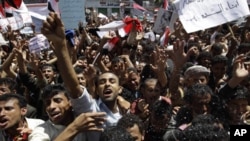Yemeni security forces used deadly force against largely peaceful protesters in the southern city of Aden last month, according to a Human Rights Watch report published Wednesday.
Human Rights Watch says Yemeni security forces used a range of weapons against protesters in Aden, including assault rifles and machine guns.
It says between February 16 and 25 at least nine people were killed and more than 150 people were injured, some of them children.
Tom Porteous directs the London office of Human Rights Watch.
"In some cases we have documented killings that took place when protesters were trying to run away or trying to take cover from the shooting of the security forces," said Porteous. "This is excessive use of force that has been used and it is quite clear from the documentation that we have been able to gather. "
Yemen's government has blamed the bloodshed on the Southern Movement, which led the protests against President Ali Abdullah Saleh. But Human Rights Watch says on the whole, protesters were peaceful.
Mr. Saleh, 64, has been in power for more than three decades. In recent weeks there have been widespread protests against his rule, which critics say has seen Yemen plagued by corruption and poverty.
Porteous says President Saleh has tried to use the might of his security forces to quell unrest.
"The knee-jerk reaction of a repressive regime is to respond to protests against repression with further repression," he said.
Since 2007 the port city of Aden has been the center of protests in Yemen’s southern provinces, where inhabitants have called for increased economic opportunities and political autonomy or secession. The south was a separate republic until it was unified with the north in 1990.
Jinny Hill, a Yemen analyst with London-based research group Chatham House, says clashes between security forces and civilians in the region is not a new development.
"There is a long history of violence between the security services and the civilian population in Aden and in other areas in the south because of the political dynamics," said Hill. "There have been protests on the streets in southern cities for several years now, people protesting about economic conditions, unemployment, and corruption and many of them are calling for the south to separate from the north."
But she says the anti-government protests that are taking place across Yemen are adding a new dimension to the secessionist movement.
She says that some people in the south who were calling for their region to secede are now calling for the president to stand down.
She says some are now thinking about changing their demands and considering instead a new political future for Yemen within a unified political framework.
In Yemen’s capital on Tuesday one person was killed and at least 65 injured when Yemeni police fired on protesters. State news blamed the shooting on gunmen linked to a tribal leader.
Hill says President Saleh is wary of using violence against protesters.
"We saw a few weeks ago the first incident of violence was a man in civilian clothes who opened fire on some of the protesters around the university and there were a wave of defections from the president's ruling party that followed that incident," she said. "And I think that presented the president with a real challenge because he's obviously concerned about the political momentum that's building up behind the street protesters but he recognizes the sensitivity of actually trying to confront them directly."
President Saleh has refused to step down until his leadership is due to end in 2013.
Rights Group Says Yemen Used Deadly Force in Aden




